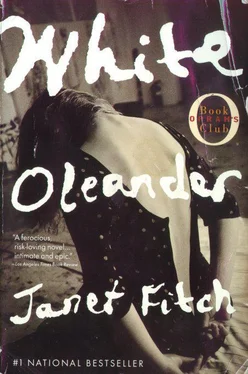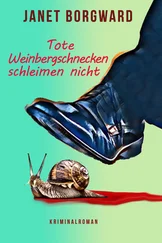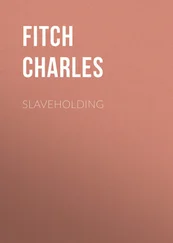Janet Fitch - White Oleander
Здесь есть возможность читать онлайн «Janet Fitch - White Oleander» весь текст электронной книги совершенно бесплатно (целиком полную версию без сокращений). В некоторых случаях можно слушать аудио, скачать через торрент в формате fb2 и присутствует краткое содержание. Жанр: Современная проза, на английском языке. Описание произведения, (предисловие) а так же отзывы посетителей доступны на портале библиотеки ЛибКат.
- Название:White Oleander
- Автор:
- Жанр:
- Год:неизвестен
- ISBN:нет данных
- Рейтинг книги:3 / 5. Голосов: 1
-
Избранное:Добавить в избранное
- Отзывы:
-
Ваша оценка:
- 60
- 1
- 2
- 3
- 4
- 5
White Oleander: краткое содержание, описание и аннотация
Предлагаем к чтению аннотацию, описание, краткое содержание или предисловие (зависит от того, что написал сам автор книги «White Oleander»). Если вы не нашли необходимую информацию о книге — напишите в комментариях, мы постараемся отыскать её.
White Oleander — читать онлайн бесплатно полную книгу (весь текст) целиком
Ниже представлен текст книги, разбитый по страницам. Система сохранения места последней прочитанной страницы, позволяет с удобством читать онлайн бесплатно книгу «White Oleander», без необходимости каждый раз заново искать на чём Вы остановились. Поставьте закладку, и сможете в любой момент перейти на страницу, на которой закончили чтение.
Интервал:
Закладка:
“I used to go with a man who took me to the finest restaurants in the city,” Olivia continued. “And after we’d eaten, he’d stand up and say, ‘Now where shall we go?’ And we’d move on to another restaurant, where he’d eat a second complete meal, soup to dessert. Sometimes three in a row.”
She cut a small piece of the gravlax and put it on a piece of black bread, daintly spooned a bit of dill sauce onto it, and ate it like it was the last piece of food in the world. I tried to imitate her, eating so slowly, tasting the raw pink fish and the coarse, sour bread, salt and sugar around the rind, flavors and scents like colors on a palette, like the tones in music.
“A lovely man too. Intelligent, rich as Croesus,” she said, blotting her lips and taking a sip of wine. “But he lived like a tapeworm.” She gazed into her straw-yellow wine, as if the solution to the man’s greed was there. Then she shook her head when it wasn’t. “Enormous man, probably weighed three hundred pounds. A very unhappy person. I felt sorry for him. Poor Mr. Fred.”
I didn’t want to imagine her making love to this three-hundred-pound man, lying under him as he hurriedly thrust into her, so he could go again. “How did you know him?”
She fanned away a bee that was exploring her wine. “I was a loan officer in one of his banks.”
I laughed out loud, picturing Olivia as a bank employee. Nine to five, behind a desk, in gabardine and flat shoes. Eating lunch at the Soup Exchange. “You’re kidding.”
“Sure, what did you think, I was some honeychile walking Van Nuys Boulevard in a bunnyfur jacket? I have an MBA. Oh, I knew all about money, except how to get my hands on some. I was out there making payments on a Honda Accord and keeping my little apartment off Chandler, just like everybody else.”
“And the big man saved you from yourself.”
She sighed. “Poor Mr. Fred. He had a heart attack last year. His brother got everything.” She shrugged her shoulders. “But what do you expect of a man who’ll eat three dinners in a row?”
I SAT AT MARVEL’S, watching them eat. They stared at the television the whole time, raising their forks to their lips like windup toys, oblivious to whether it was tuna casserole or cat food gratine. I’d begun to cook, told Marvel I might want to become a chef, it was a good living for a woman. I was gaining weight. My ribs smoothed into the buttery flesh of my torso. I admired my breasts in the mirror, wished Ray could have seen them, cupped them in his mauled hands. I liked the way my body moved as I walked down the street. Marvel thought it was just my age, filling out, she called it. But that wasn’t it. I had been moving too fast. I had been too hungry to become a woman.
13
FULL-ON SUMMER fell like a hammer. By nine in the morning you could already start dreading how hot it was going to be. Olivia took me for rides in the Corvette, up the 101 and then out one of the canyons, Topanga, Kanan Dume, to the beach, then we’d cruise back down the coast highway, the wind against our skins bared to the sun, ignoring the shouts of men from other cars. I’d never felt so beautiful and unafraid.
Sometimes she’d make up a pitcher of rum punch and play Brazilian music on the stereo—Milton Nascimento, Gilberto Gil, Jobim. Astrud Gilberto sang interestingly flat, like she was half asleep in a hammock, singing to a child. We sat in the living room on the striped cotton daybed, the fans turning slowly overhead, eating mangos with ham and looking at Olivia’s pictures of Brazil. She pronounced the names of the cities in their hushing Portuguese: Rio de Janeiro, Itaparica, Recife, Ouro Preto, Salvador. Pictures of colonial cities painted popsicle colors, black women in white dresses sending candles out to sea. Pictures of Olivia at Carnival, wearing a dress of silver tinsel slit up to the armpits, her hair feathery and wild. She held a white man’s hand, he was tanned and had flat blue eyes.
“You’d love Carnival,” she said. “You dance for three days straight.”
“I hate crowds,” I said, drunk on the rum punch she’d made, sweet and heavy as a brick. “I’m always afraid I’m going to be crushed.”
“It happens,” Olivia said, nodding to the samba music. “You better not fall down at Carnival.”
After a while she got up to dance. I lay down and watched her in her head scarf and wrapped skirt, moving in time to the complex rhythms of the samba. I imagined her dressed only in tinsel and sweat, dancing with the throbbing crowd under the southern sun, the smells of rum and mangos and Ma Griffe. The music moved along her body in waves, her feet shuffling in small, hesitation steps, arms swaying like palms atop her raised elbows. Hundreds of thousands of people of every hue pulsing under the sun.
“Dance with me,” she said.
“Can’t dance,” I said. “I’m a white girl.”
“Don’t say can’t.” She grinned, her hips shifting in subtle circles like a stream over rocks. She grabbed my hand and pulled me off the daybed.
I stood awkwardly before her, tried to copy her movements, but even slightly inebriated, I was aware of how ridiculous I was, how out of time with the music, how out of step. Her body moved in ten directions at once, all harmonized, supple as ribbon. She laughed, then covered her smile with her hand. “Feel the music, Astrid. Don’t look at me. Close your eyes and be inside it.”
I closed my eyes, and felt her hands on my hips, moving me. Each hip turned independently of the other. She let go, and I tried to keep the rhythm, letting my hips swing in big arcs to the complex beat. I lifted my arms and let the waves of motion travel along the length of me. I closed my eyes and imagined us in Brazil, on a beach with a palm-covered bar, dancing dangerously with men we would never see again.
“Oh Astrid, you’ve got to come to Carnival,” Olivia said. “We’ll tell your keeper your class is taking a trip to see the Liberty Bell, and steal you away. For three days in a row you don’t sleep, you don’t eat, you just dance. I promise, you’ll never move like a white girl after Carnival.”
When the songs turned quiet, she put her arm around my waist, danced with me close. Her perfume still smelled fresh, despite the heat and the sweat, like pine trees. I was as tall as Olivia now, and her holding me made me awkward, I was stepping on her feet.
“I’m the man,” she said. “All you have to do is follow.”
I could feel her leading me, her hand open on the small of my back, always dry, even in the heat.
“You’re growing up so fast,” she said softly in my ear as we danced like waves on Copacabana. “I’m so glad I found you now. In a year or two, it would have been different.”
I imagined she was a man, dancing with me, whispering. “Different how?”
“Everything would have been decided,” she said. “Now you’re so open. You could go any number of ways.” She danced me in slow circles, teaching my feet how to move, my hips to trace the sign of infinity.
THE WINDS of September fanned harvests of fire on the dry hills of Altadena, Malibu, San Fernando, feeding on chaparral and tract homes. The smell of the smoke always brought me back to my mother, to a rooftop under an untrustworthy moon. How beautiful she had been, how perfectly unhinged. It was my second season of fire without her. Oleander time. I read that the Jews celebrated their New Year now, and decided I too would calculate time from this season.
Coyotes drifted down into the city at night, driven by thirst. I saw them walking down the center line on Van Nuys Boulevard. The smoke and ash filled the basin like a gray bath. Ashes filtered into my dreams, I was the ash girl, born to these Santa Anas, born to char and aftermath.
Читать дальшеИнтервал:
Закладка:
Похожие книги на «White Oleander»
Представляем Вашему вниманию похожие книги на «White Oleander» списком для выбора. Мы отобрали схожую по названию и смыслу литературу в надежде предоставить читателям больше вариантов отыскать новые, интересные, ещё непрочитанные произведения.
Обсуждение, отзывы о книге «White Oleander» и просто собственные мнения читателей. Оставьте ваши комментарии, напишите, что Вы думаете о произведении, его смысле или главных героях. Укажите что конкретно понравилось, а что нет, и почему Вы так считаете.












